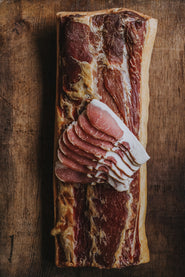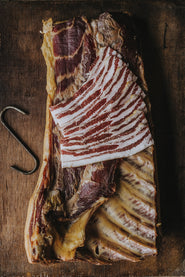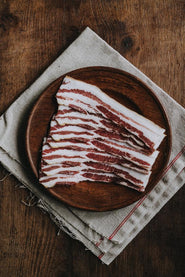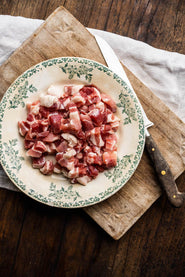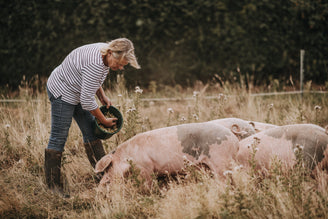As one of the earliest food preservation techniques, the curing process has deep roots in our food history. Techniques can be traced back for thousands of years to early civilisation. The principles of food preservation have remained the same throughout time, the need to extend the life of food, making it available for another day. Landscape, seasons and local breeds have shaped the way curing is carried out all over the world, but the fundamental principals are grounded in the same thinking.
Bacteria
Fresh meat does not have a very long shelf life. Once a carcass is cut the combination of oxygen and enzymes start working to break fibres down. If carefully monitored this can add to texture and flavour of the meat, if this goes too far it results in meat that has become rancid. Meat with more fat usually takes longer to spoil as the enzymes take longer to break down fat and the fat helps to keep the surface of the meat drier and less hospitable for spoilage bacteria.
Bacteria thrive on meat, but importantly most of these bacteria are good and are a key part of the ageing or curing process.
The key to good curing is controlling moisture, it is within the moisture where the ‘spoilage’ bacteria thrive, the likes of listeria are the major major concerns.
Good bacteria like penicillium thrive in dry salty conditions, they create lactic acid which prevents food poisoning moisture-loving bacterias from attaching to the meat. By controlling the levels of salt in the cure you can stabilise the bacterial process.

Nitrates
The biggest concern for all meat curing is a relatively rare disease called ‘Botulism’. Potentially fatal botulism is caused by toxins released from a bacteria called ‘Clostridium Botulinum’. Whilst it is rare, due to its fatal nature, we take botulism seriously, as do food scientists.
There is one way to make absolutely sure that botulism can never cause any harm, and that is to use nitrates as part of a cure.
The use of nitrates has over the years become relatively controversial with producers split into two camps - you will have seen claims of ‘nitrate free’ bacon on many supermarket and other retailer’s shelves.
Most of the ‘no added nitrate’ or ‘nitrate free’ products use a plant source, such as celery or beetroot, to provide the vital nitrite in the cure. However, it is important to understand that the body doesn’t distinguish between a ‘natural’ nitrate and an artificial one, so if you see ‘beetroot’ or other vegetables that are naturally high in nitrates in the cure, you will still be exposed to the same effects, as regardless of the source, the body will still create the same reaction.
In addition to the misleading nature of ‘plant based’ nitrates, what is also worrying is they are less regulated than other more commonly used nitrates, this means that the levels of nitrate in the cure could be even higher than a traditional curing salt that has undergone rigorous and extensive testing.
Some scientist even argue that ‘nitrate free bacon’ doesn’t really exist.
The only way to produce a truly nitrate free bacon is by using a salt/sugar mix.

Globalised Food Chain
As with most successful products, it doesn’t take long before industry finds a way to globalise and mass produce food products with more care for the bottom line than the food itself.
In the case of cured foods such as bacon, the accelerated food system has caused a danger to our health. Firstly from the meat itself.
All industrial scale cured meat uses farming systems that are inherently wrong, cruel and unhealthy. You will have seen images of pigs caged, with limited movement and driven mad from boredom which makes these pigs become aggressive. As one of the most intelligent farmyard animals, these systems are beyond a disgrace. The meat they produce is poor quality and antibiotics are used routinely as part of the production process, because these cruel environments are the perfect haven for food poisoning bacteria, and the fast-growing animals have very little natural resistance.
Before the curing process has even begun these systems start from rocky ground.
Secondly, unhealthy and unreasonable levels of preservatives are used in their cures - as well as a cocktail of all sorts of other nasty chemicals. The reason behind this is to unnaturally prolong the shelf-life and drive down the cost of production.
There is no doubt processed food is seriously bad for our health, the leading cause of bowel and stomach cancers, diabetes and even links to Parkinsons, not to mention the western obesity crisis. The global food system is creating food with serious health consequences.
There is a big difference between industrial ‘processed foods’ and foods like ours. Our native breed bacon for example, goes through an additional step of processing, than say, a steak, however that 'processing' in reality, is worlds apart from mass produced processed bacon.
Traditional, artisanal food has come under threat by industrialised food systems and confusing headlines. Eating a very small amount of nitrates in your diet will not kill you or lead you to be more at risk of some awful disease, in fact many of us are consuming nitrates in our diets without even realising it (spinach, carrots, lettuce and pomegranates are all high in nitrates) however eating large volumes of highly processed unhealthy foods with unhealthy and unnatural levels of preservatives and chemicals will of course increase your likelihood of contracting certain diseases.

The Pipers Farm Way
At Pipers Farm we believe in common-sense and traditional methods of farming and producing food.
Peter and Henri’s mission when they founded Pipers Farm over 30 years ago was to produce food that they were happy to feed to their children, food that they could stand behind with complete confidence. Nothing has changed today, we still live and breathe those very same values, and in fact, today, their son Will who was the beneficiary of healthy, nutritious food, is now leading Pipers Farm.
Our bacon is not ‘nitrate free’ - we refuse to mislead our customers by going down the route of ‘plant extract’ or ‘plant based’ cures that could be passed off to most unwitting customers as ‘nitrate free’. We use a trace amount of Sodium Nitrite E250 and Potassium Nitrate E252 in our cure. It is there to protect you not to harm you.
Our bacon is traditionally brine-cured then air dried for a week. If you choose to have your bacon smoked it is cold smoked over natural beechwood chips. It’s pretty special stuff, winning a place in the food hall of fame as one of the countries Top 50 Best Products in the Great Taste Awards.
Our mission is always to produce food that tastes incredible, has been produced ethically and sustainably and that we can stand behind with complete confidence.

